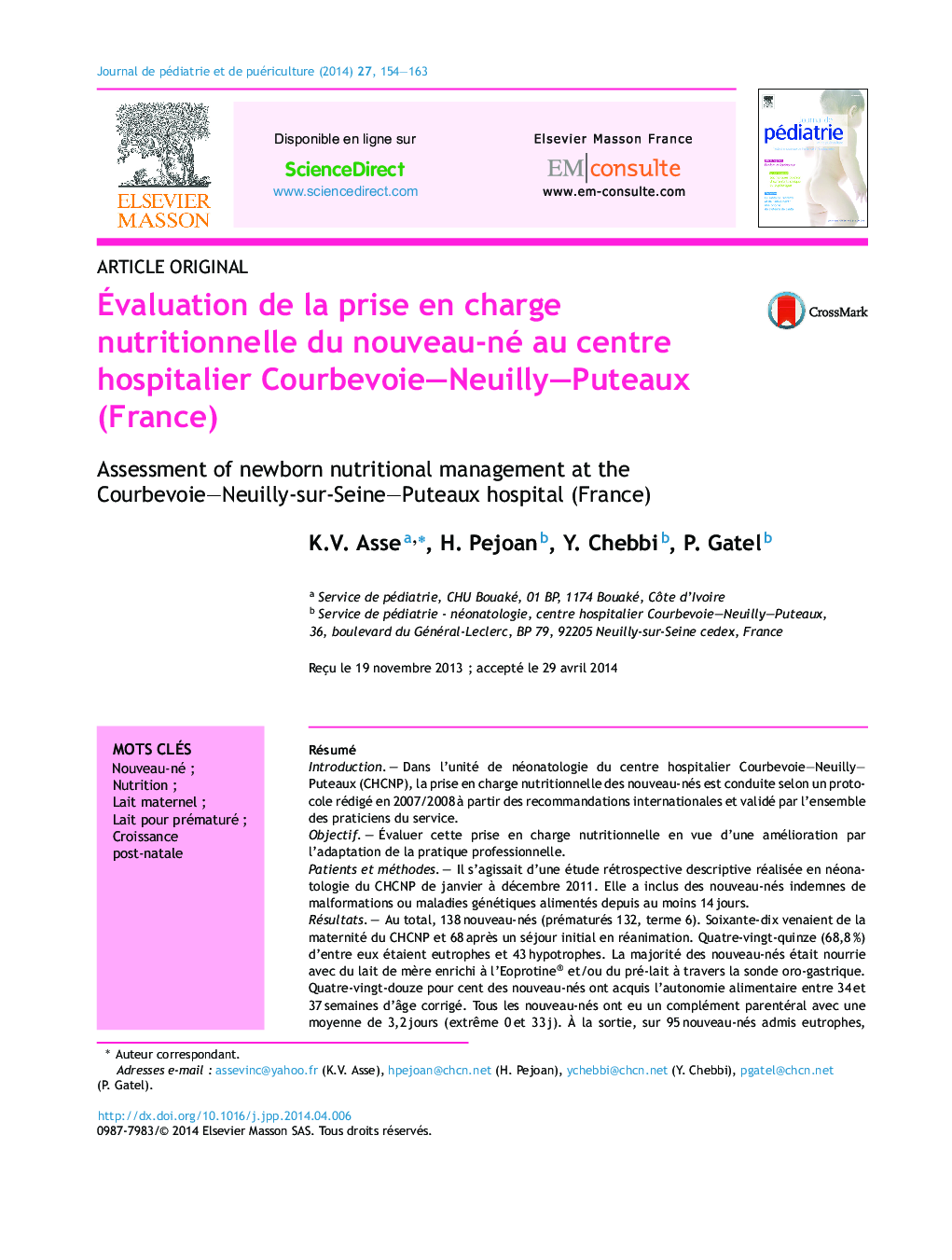| Article ID | Journal | Published Year | Pages | File Type |
|---|---|---|---|---|
| 4169919 | Journal de Pédiatrie et de Puériculture | 2014 | 10 Pages |
RésuméIntroductionDans l’unité de néonatologie du centre hospitalier Courbevoie–Neuilly–Puteaux (CHCNP), la prise en charge nutritionnelle des nouveau-nés est conduite selon un protocole rédigé en 2007/2008 à partir des recommandations internationales et validé par l’ensemble des praticiens du service.ObjectifÉvaluer cette prise en charge nutritionnelle en vue d’une amélioration par l’adaptation de la pratique professionnelle.Patients et méthodesIl s’agissait d’une étude rétrospective descriptive réalisée en néonatologie du CHCNP de janvier à décembre 2011. Elle a inclus des nouveau-nés indemnes de malformations ou maladies génétiques alimentés depuis au moins 14 jours.RésultatsAu total, 138 nouveau-nés (prématurés 132, terme 6). Soixante-dix venaient de la maternité du CHCNP et 68 après un séjour initial en réanimation. Quatre-vingt-quinze (68,8 %) d’entre eux étaient eutrophes et 43 hypotrophes. La majorité des nouveau-nés était nourrie avec du lait de mère enrichi à l’Eoprotine® et/ou du pré-lait à travers la sonde oro-gastrique. Quatre-vingt-douze pour cent des nouveau-nés ont acquis l’autonomie alimentaire entre 34 et 37 semaines d’âge corrigé. Tous les nouveau-nés ont eu un complément parentéral avec une moyenne de 3,2 jours (extrême 0 et 33 j). À la sortie, sur 95 nouveau-nés admis eutrophes, 82 (86,3 %) sont maintenus eutrophes et 13 (13,7 %) ont acquis un retard de croissance extra-utérin. Seulement 6 (13,9 %) des 43 hypotrophes ont bénéficié du rattrapage pondéral et sortis eutrophie.ConclusionL’hypotrophe rattrape difficilement le retard acquis in utero. Pour ces nouveau-nés, l’utilisation des préparations nutritionnelles enrichies en protéine et calorie type formule pour prématuré étape 1 semble indiquée.
SummaryIntroductionIn the neonatal unit of the Courbevoie–Neuilly–Puteaux Hospital (CHCNP), the nutritional management of neonates is conducted according to a protocol written in 2007/2008 from international guidelines and approved by all practitioners’ service.ObjectiveTo assess this nutritional management in order to improve the adaptation of professional pratice.Patients and methodsThis was a retrospective study from January 1 to December 31, 2011 in the neonatology unit of CHCNP. It focused on infants with no malformations or genetic disease and fed for at least 14 days.ResultsOne hundred and thirty-two preterm and 6 term infants were included. Seventy came from the maternity CHCNP and 68 after an initial stay in the ICU. On admission, 95 (68.8%) patients were eutrophic and 43 small for gestational age. Nutrition was given by oro-gastric tube in most cases with breast milk enriched with Eoprotine® and/or infant formula milk. Ninety-two percent of patients gained autonomy between 34 and 37 weeks corrected age. Additional parenteral was conducted for 3.2 days on average (range 0–33 days). Out of the 95 eutrophic newborn at admission, 82 (86.3%) remained eutrophic at discharge and 13 acquired postnatal growth retardation. Concerning the 43 hypotrophic newborn, only 6 (13.9%) became eutrophic at discharge with weight above the 10th percentile; the others have maintained weight under the 10th percentile.ConclusionLow birth weight hardly catches the delay acquired in utero. For these infants, the use of enriched protein and calorie standard formula for premature step 1 seems appropriate nutritional products.
